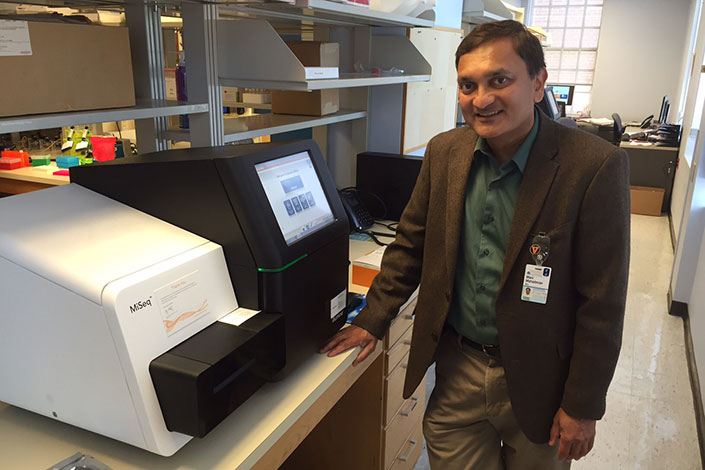The University of Virginia Health System has opened a high-tech clinical genomics lab that will personalize care for patients, help doctors determine the best treatments for cancers and other diseases, and allow U.Va. to offer the most cutting-edge clinical trials.
The new lab, under the direction of Dr. Mani S. Mahadevan, a professor in the Department of Pathology, gives doctors the power to examine patients’ DNA quickly and effectively. By so doing, they can diagnose genetic disorders, identify cancer-causing gene mutations and tailor treatments for maximum effectiveness. In short, it puts U.Va. at the forefront of precision medicine – medicine that is personalized for each patient’s particular condition and needs.
“We’re using the latest technology for DNA sequencing. It’s called ‘massively parallel sequencing’ or ‘next-gen sequencing.’ It enables us to sequence millions of bases of someone’s DNA – or many, many, many genes at once,” Mahadevan said. “In the case of one of the tests we’re using now, it allows us to sequence many genes within a cancer patient’s tumor, to determine what mutations or changes they have in their tumor’s DNA, with the goal of helping the clinicians decide if the patient will respond or not respond to a particular therapy. So that’s where the precision medicine comes in – it’s very individualized to that patient and the particular cancer that patient has.”
By examining the changes in the tumor’s DNA, doctors can obtain vital information on how best to battle the disease, said Mahadevan, the medical director of the Clinical Genomics and Molecular Diagnostics Laboratories. “By sequencing the cancer, we can figure out, ‘Oh, they have this particular mutation, so that means they may have a better chance of responding to a particular therapy that’s either out there in the clinic or that’s being developed in clinical trials,’” he said. “This is particularly useful for patients with lung cancer, colon cancer, melanomas, brain cancer and blood cancers like the leukemias.”
The facility will also have tremendous effects on the treatment of genetic disorders, such as the heart condition known as cardiomyopathy, and in diagnosing genetic disorders, such as in children with neurological disorders or developmental disorders. “This technology allows us to sequence over 4,500 genes at once in a child and a child’s parents to help us find out if there’s a genetic basis for their clinical condition,” Mahadevan said. “That panel covers pretty much most of the known genetic disorders.”
The new lab is certified through the Clinical Laboratory Improvement Amendments, the federal government’s regulatory program that oversees such facilities. The certification offers important benefits, as it allows the lab results to be used both clinically for patient care and in clinical trials testing new treatments, Mahadevan said.
“Many of the new therapies that the drug companies are developing require that this kind of analysis be done in order to select appropriate participants,” he said. “So having this capability in the facility here enables U.Va.’s Cancer Center and the hospital to provide state-of-the-art clinical care for our cancer patients as well as to get involved in cutting-edge trials.”
The new lab represents an important collaboration between the U.Va. Medical Center and the School of Medicine, and Mahadevan and his colleagues are tremendously excited by its arrival.
“To have this now at U.Va.,” he said, “is a big step forward for the institution and the patients who come here.”
Media Contact
Article Information
June 29, 2015
/content/new-technology-ushers-era-precision-medicine-uva

